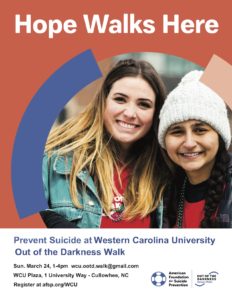The Center for Disease Control and Prevention (CDC) defines mental health as “our emotional, psychological, and social well-being. It affects how we think, feel, and act. It also helps determine how we handle stress, relate to others, and make healthy choices.” And, it is impactful at every stage of life, from childhood through adulthood. However, […]
You’re not alone! Mental health and coping resources at WCU
Story co-written with Cami Couch and edited by Keegan Wiggins Coping is how to effectively manage something difficult going on in a person’s life. This is much easier said than done, which is why both healthy and unhealthy coping mechanisms need to be addressed for the students of WCU and the surrounding community to explore options […]
Student athlete mental health at WCU
“If practice runs late tonight I know I’ll have to pull another all-nighter for my exam tomorrow.” Worries like this cross the mind of Bella Pighini, a member of the women’s soccer team at WCU, all the time. As a college student and athlete, a lot stress stems from balancing and managing the two. At […]
WCU talks mental health
This story was written and co-produced with Jillian Kassor When coming to college for the first time, students are braced for a massive change of lifestyle. However, with a high emotion and high stress environment, their mental health may change as well. While this change in mental health has always been a reality, more students today […]
Could smartphones become the new therapists?
According to Statista, it is predicted that in 2019, around 2.5 billion people in the world use smartphones and the number will continue to rise in the coming years. We’ve heard of how our smartphones cause us more harm than good, even stories of how phones have caught fire in the hands of its user. […]
Out of the Darkness walk – WCU joins in the discussion about mental health and suicide
According to the most recent data obtained from the CDC by the American Foundation for Suicide Prevention (AFSP), in North Carolina about one person dies by suicide every six hours on average, and it is the 3rd leading cause of death for those between the ages of 15 and 34. Nearly twice as many people die […]







